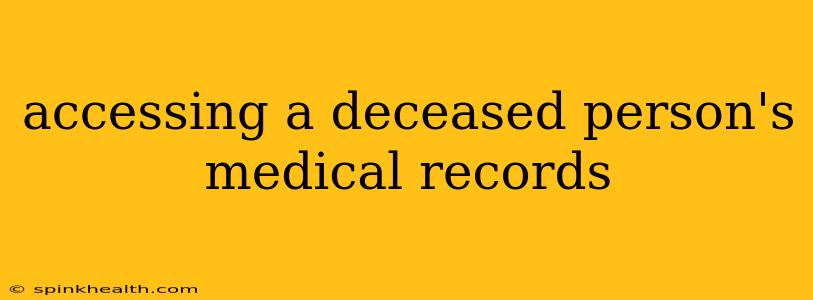The death of a loved one is a deeply emotional experience, often compounded by the practicalities of managing their affairs. Among these, accessing their medical records can feel like navigating a complex maze. Understanding the process is crucial for settling estates, pursuing potential legal claims, or simply gaining closure. This guide unravels the intricacies of accessing a deceased person's medical records, offering clarity and guidance during a difficult time.
Who Can Access a Deceased Person's Medical Records?
This is often the first question that arises. Generally, access is granted to those with a legal right to the information, primarily the executor or administrator of the estate. This individual, appointed by the will or the court, is legally responsible for managing the deceased's affairs, including their medical records. However, immediate family members, such as a spouse or children, may also be granted access, especially if they can demonstrate a legitimate need, like understanding the cause of death or settling medical bills. The specific requirements vary by state and the healthcare provider's policies.
What Documents Do I Need to Access the Records?
Preparing the necessary documentation is key to a smooth process. Typically, you'll need to provide proof of your relationship to the deceased, such as a copy of the death certificate, marriage certificate, or birth certificate. You’ll also need to present legal documentation demonstrating your authority to access the records—this could be a copy of the will naming you as executor, court documents appointing you as administrator, or a power of attorney granted before the death. Finally, you will likely need to provide identification to verify your identity.
How Do I Obtain a Copy of the Death Certificate?
Obtaining a copy of the death certificate is usually the first step. This vital document serves as irrefutable proof of death and is essential for accessing medical records. The process varies by location; generally, you can request it from the vital records office in the county or state where the death occurred. Fees usually apply, and processing times can range from a few days to several weeks.
Can I Access the Records if I'm Not an Executor or Family Member?
In some circumstances, individuals outside the immediate family or the executor may need access. For instance, a lawyer representing the estate might require the records for legal proceedings. In these cases, authorization from the executor or administrator is typically necessary. The healthcare provider may also require a court order or other legal documentation to release the information to a third party.
What Information Is Included in a Deceased Person's Medical Records?
The contents of a deceased person's medical records are extensive, encompassing various aspects of their health history. This often includes medical history, diagnoses, treatments received, test results, hospitalization records, and physician notes. The extent of information released might be limited by privacy laws like HIPAA, even after death.
What if the Healthcare Provider Refuses to Release the Records?
If a healthcare provider refuses to release the records despite presenting the appropriate documentation, you should first try to understand their reasoning. They might need further clarification or additional documentation. If the issue persists, you may need to consult with an attorney to explore legal options. Healthcare providers must adhere to specific regulations concerning the release of medical information, and an attorney can assist in navigating this process.
Conclusion: Navigating the Process with Patience and Persistence
Accessing a deceased person's medical records can be a complex and emotionally challenging process. Patience, clear documentation, and potentially legal counsel are often essential. Remember, understanding the legal framework, gathering necessary documentation, and clearly communicating your request are vital steps to successfully obtaining the information you need. While the process may seem daunting, approaching it systematically can lead to a more positive outcome, providing closure and clarity during a difficult time.

